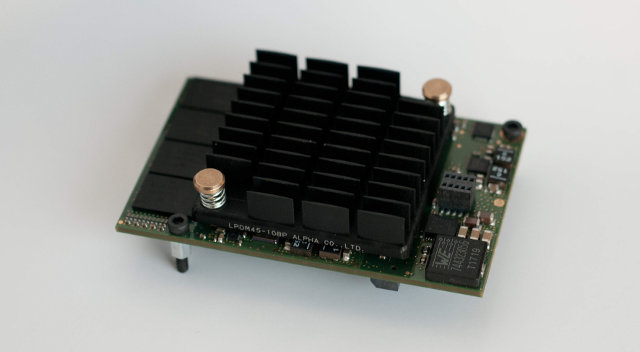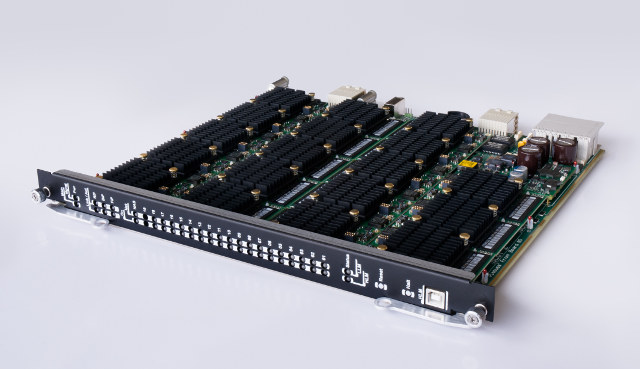Scaleaway launched their hosting services with dedicated ARM servers based on Marvell Armada 370/XP quad core ARM Cortex A9 processor this spring for 10 Euros per month, or 0.02 Euro per hour, and at the time, some people found it was not that attractive, as similarly priced plans provided by Linode or DigitalOcean with Intel server were also available, and it might have only been really compelling for people who specifically required an ARM server to play with. The company has now slashed its price, and it has become very attractive at 2.99 Euros (~$3.37 US) per month or 0.006 Euro per hour, excluding VAT. The server technical specifications and features are still the same: Server based on Marvell Armada 370/XP quad core ARMv7 processor Memory – 2 GB Memory Storage – 50 GB SSD Disk (extra space available for 1 Euro per 50GB) 1x Reserved public IPv4 200Mbit/s – Unmetered […]
Scaleway Provides Dedicated ARM Servers for 10 Euros per Month, 0.02 Euro per Hour
Earlier this year, Online Labs launched a beta hosting program using custom-designed C1 dedicated servers powered by Marvell Armada 370/XP quad core processor. The company has now launched a commercial service called Scaleway providing hosting service on these baremetal servers for 9.99 Euros per month, or 0.02 Euro per hour, as well as a “Infinite Storage” service with 1GB data for 0.02 Euros per month. Here are the details of the 10 Euros plan: Server based on Marvell Armada 370/XP quad core ARMv7 processor Memory – 2GB Memory Storage – 50GB SSD Disk 1x Reserved public IPv4 200Mbit/s – Unmetered bandwith Operating Systems – Ubuntu, Debian, Fedora, ArchLinux ARM. Docker supported. That’s not a VPS, but a dedicated server. For reference, I currently pay around $20 per month (Linode) for a server with an Intel Xeon E5-2680 dual core processor with 2 GB RAM and 50 GB SSD storage, and 3 […]
Linaro 15.03 Release with Linux 4.0 and Android 5.1
Linaro has just announced their 15.03 release with Linux 4.0-rc4 (baseline), Linux 3.10.72 and 3.14.36 (LSK), and Android 5.1. The organization has worked on hardware platforms from members namely Qualcomm, ARM, HiSilicon, Samsung, and STMicro, including the recently announced 96Boards boards, and other ARMv8 platforms. Highlights of the release: Linux Linaro 4.0-rc4-2015.03 updated linaro-android topic added a few build/boot fixes for Arndale (llct-misc-fixes topic) GATOR topic: version 5.20.1 updated integration-linaro-vexpress64 topic by ARM LT (FVP Base and Foundation models, and Juno support) updated topic from Qualcomm LT (ifc6410 board support) simple EEPROM framework (via Qualcomm LT’s topic) updated topic from HiSilicon LT (Hi36xx, HiP04, and X5HD2 families support) rebased “ILP32 patch set v3” onto 4.0-rc2 Linaro builds of AOSP 15.03 updated all the baselines to AOSP 5.1 added commit based trigger feature to CI builds Linaro OpenEmbedded 2015.03 integrated Linaro GCC 4.9-2015.03 dismantled meta-aarch64 layer created meta-ilp32 layer cleaned out […]
Raspbian Image with Docker 1.5.0 Released for Raspberry Pi Boards
I’ve read quite a few articles mentioning Docker recently, but never really looked into it. So what is Docker? The developers describe it as: Docker is an open platform for developers and sysadmins to build, ship, and run distributed applications. Consisting of Docker Engine, a portable, lightweight runtime and packaging tool, and Docker Hub, a cloud service for sharing applications and automating workflows, Docker enables apps to be quickly assembled from components and eliminates the friction between development, QA, and production environments. As a result, IT can ship faster and run the same app, unchanged, on laptops, data center VMs, and any cloud. In practice, it looks like a lightweight virtualization solution that facilitates apps distribution to different operating systems and hardware platforms. For example, if your development machine is running Ubuntu 14.04 and you’ve developed an app requiring Python 3.0, Docker should make it a breeze to it on […]
Snappy Ubuntu Core is an IoT Linux Distribution for ARM and x86
Canonical has announced a version of Ubuntu specifically designed for IoT devices running Linux, with a low hardware requirements, and a new package manager called snappy, replacing apt-get for this version of Ubuntu, which provides simpler, faster, and more reliable updates, stronger security, and allows roll-backs in case something goes wrong. Easy firmware updates are something missing in most connected device, which means they are more vulnerable to potential hackers, but with snappy security updates should be able to make it regularly, so that if something like heartbleed occurs again, you know your router, home automation gateway, connected washing machine, or robot will be soon patched automatically. Let’s go through the hardware requirements first: Processor – 600 MHz processor (ARMv7 or greater, or x86) System Memory – 128 MB RAM or greater (The system itself uses 40 MB RAM) Storage – 4GB flash / storage for factory reset and system […]







